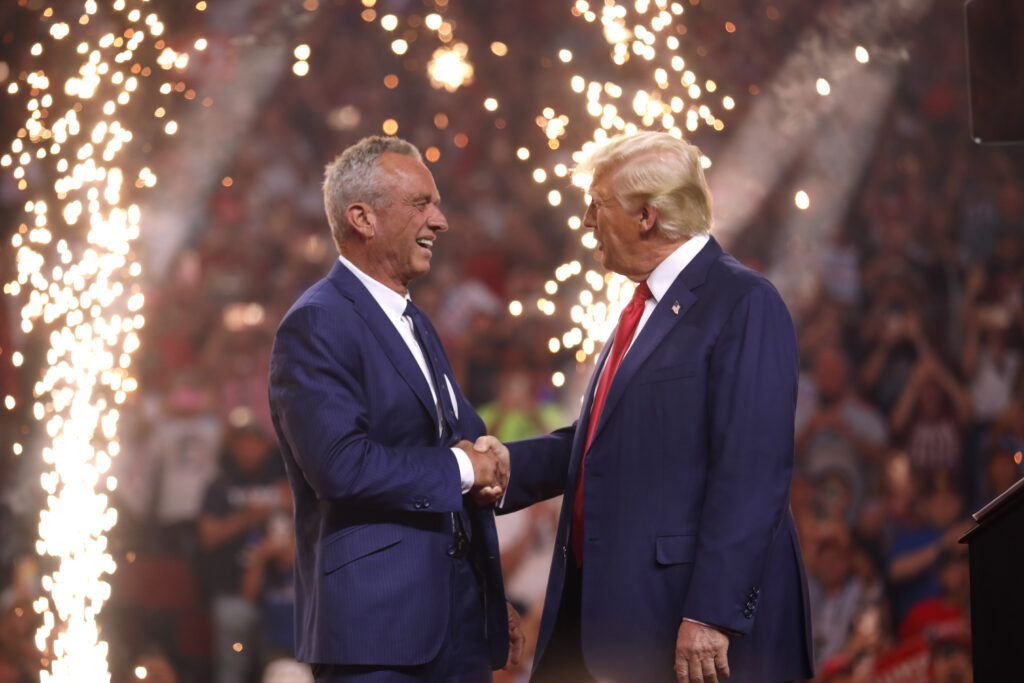What Donald Trump’s Election Victory Means for Food Tech in the US
6 Mins Read
Donald J. Trump is president-elect again. Based on his track record and policy proposals, his election promises a rocky period for the US food tech sector.
America has just elected a climate change denier as president. In his first term, Donald Trump rolled back over 100 climate policies and pulled the US out of the Paris Agreement. In his campaign leading up to the election, he has repeatedly spewed false claims that ignore climate science and incorrectly boasted about the “clean air” under his administration.
Now, he gets a chance to do it all over again. The second Trump term could see the Environmental Protection Agency (EPA) shaken up, even as it has just barely recovered from the plethora of staffing exits and budget cuts that Trump imposed when he was in the White House the first time around.
The ‘Make America Great Again’ section of the GOP has also been against climate-friendly foods like cultivated meat, with Florida and Alabama – both states that helped him regain the presidency – having banned these proteins already. Other Trump-worshipping Republicans, like Illinois’s Chris Miller, are hoping to introduce similar restrictions. And JD Vance, the vice-president-elect, recently slammed “disgusting fake meat”, labelling it “highly processed garbage”.
The signs are ominous for food tech, and the wider climate-centric agrifood industry. Cultivated meat approvals could now be on hold, the ultra-processed bandwagon against alternative proteins will likely get louder, Americans will further detach meat-eating from climate change, and regenerative agriculture – with all its shaky promises – could have a field day.
We’ve put together a roundup of the best news stories out there that explain what Trump’s second presidency will mean for the food industry and its fight against the climate crisis.

1) Ag industry reckons with RFK Jr’s policy overhaul
Getting in bed with Robert F Kennedy Jr, the former independent presidential candidate turned Trump surrogate, lays bare a dark and uncertain future for many key US food and climate agencies and policies.
RFK Jr, a known anti-vaxxer, has promised to “get the toxic chemicals out of our food supply” and suggested that under Trump, “American agriculture will come roaring back and so will Americans’ health”. His proposals have worried agrifood stakeholders, who penned a letter to Congress to reject efforts to undermine science-based regulatory frameworks, given his rhetoric about the “corruption in our federal agencies”.
Read more from Helena Bottemiller Evich on Food Fix.
2) MAHA is at odds with MAGA
Kennedy’s ‘Make America Healthy Again’ slogan has signalled his war on glyphosate and chemical exposure to children through the food system. But Marion Nestle, one of America’s most prominent public health advocates, has suggested that a second Trump term would turn back the clock on nutrition research and conflicts of interest between governments and businesses.
“They’re absolutely not going to [tackle conflicts of interests],” she told Civil Eats. “We know, because it didn’t happen during the first Trump administration. The opposite happened.”
For a list of reasons why Trump’s track record is in direct opposition to the MAHA movement, read Lisa Held’s reporting for Civil Eats.
3) Why RFK Jr will find it hard to improve public health
Building on the above, there are a host of reasons why Kennedy won’t make America healthier again under Trump, who has undermined food safety and public health time and again.
He rolled back regulations and bans on toxic chemicals, denied millions of Americans access to healthcare, picked a former coal lobbyist to run the Environmental Protection Agency, and initially denied and dismissed Covid-19.
Read Christopher D Cook’s argument on this issue in the Los Angeles Times.
4) UPFs are set to take a massive hit
The concern around ultra-processed foods has ballooned in the last couple of years, but the plant-based meat industry has been the subject of biased criticism amid misguided connections of processing with nutrition.
All this will be dialled up under Kennedy’s charge, who has said “we’ve got to get off of seed oils and we’ve got to get off of pesticide-intensive agriculture”, but also faced pushback from food manufacturers defending their use of additives and other ingredients.
Read more on all this mess from Marcia Brown, Grace Yarrow, and Brittany Gibson on Politico.

5) Soil health in full focus
Yet more on the Trump-Kennedy axis. “I’m gonna let him go wild on health. I’m gonna let him go wild on the food. I’m gonna let him go wild on medicines,” Trump said of the former Democrat.
“We’re going to give farmers an off-ramp from the current system that destroys soil, makes people sick, and harms family farms,” Kennedy promised in turn, adding: “I’ve seen some of what America’s most innovative, regenerative farmers are doing today. They can literally green deserts. They rebuild depleted soils, wells that have been dry for 30 years start flowing again.”
A lot of science around regenerative farming is wobbly at best, and meat and dairy giants have happily embraced it as a greenwashing tool.
For more on Kennedy’s promises, read this round-up from Ryan Hanrahan on Farm Policy News.
6) Reshaping US health policy isn’t easy to pull off
Outlining just how difficult it would be for Kennedy to implement his agenda on the US food and health sectors, Wired points out how his lack of medical training will prevent him from heading up agencies like the FDA or the CDC, although now that Republicans have taken back the Senate, things could change.
Even so, existing laws would block RFK Jr from having a free reign over how the agency governs. He’d also find it hard to affect vaccine policies, which is undoubtedly a good thing given his stance on the same.
Read Emily Mullin and Matt Reynolds’s reasonings on Wired.
7) Food assistance programmes are under threat
Trump’s promises to slash “wasteful” government spending, cutting regulations, using more homegrown oil and gas, combined with Kennedy’s promise to dismantle organisations like the USDA, would mean “some of the most vulnerable people from low-income groups – including women, infants and children –would struggle to access healthy and nutritious diets”, according to Prof Shonil Bhagwat of the Open University’s environment and development faculty.
He noted that if Trump carries out the proposals of Project 2025 – described as a blueprint for Trump’s second term and a disaster for climate change, health, and really, most things – he would defund and repeal programmes that would have helped the USDA advance food stamps, free school meals and other nutritional initiatives. “US food assistance programmes all be diluted, if not demolished,” he told Newsweek.
For more, read Hatty Willmoth’s reporting for Newsweek.

8) Trump would leave millions of Americans hungry
Along the same theme, Bhagwat also penned his own story to talk about the looming influence of Project 2025. Economy and inflation were major issues that likely tipped voters against the incumbency in favour of Trump, but the 900-page document’s suggestions would make “healthcare less affordable and more restrictive for millions of citizens”.
It would further cut funding for health coverage for low-income Americans, and combined with the deregulation of the food industry and dietary guidelines and the defunding of food assistance programmes, it would “spell a triple whammy for the health and wellbeing” of America’s most vulnerable.
Read Shonil Bhagwat’s full argument on The Conversation.
9) Trump tariffs will make food more expensive
For all the implications of the economy on this election, the perceived disconnect between taxes and tariffs among many Americans will likely come back to haunt them.
Trump has floated the idea of up to a 20% tariff on foreign goods (and even higher on those from China), but this would mean consumers would end up paying more for Scotch whisky, Coke, Oreos, and paprika, among other popular food and drink products.
For an in-depth explanation, read Elaine Watson’s reporting for AgFunderNews.
TLDR: Electing Trump again means an unstable four years and beyond for the food sector, and disaster for the global fight against climate change.
America has made its bed, but it seems like the planet will also have to lie in it.



